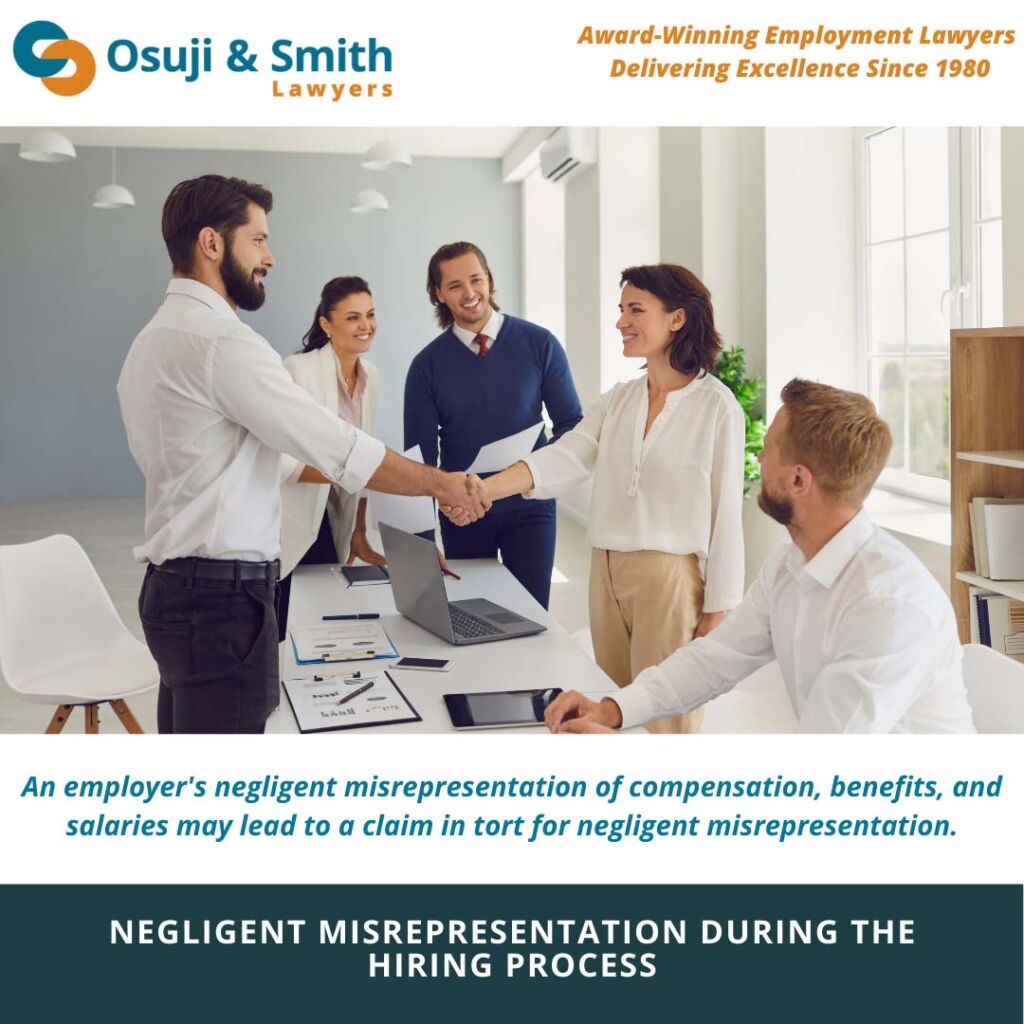Negligent Misrepresentation During the Hiring Process
Recruiting is often an opportunity to showcase the hopes and dreams of employers and employees. Candidates demonstrate their enthusiasm and imagine themselves in the job role, representing themselves as competent and the best choice for the position, while employers envision their candidates excelling within the company, hitting their target, reaching great heights of success in their careers, and raking in revenue. Some employers take this mirage a step further by touring the candidate around the office and organizing recruitment dinners. This romance comes to a screeching halt when the employee discovers after resumption that the employer-provided misleading information during the hiring process.
An employer’s negligent misrepresentation of compensation, benefits, and salaries may lead to a claim in tort for negligent misrepresentation. Even if the alleged negligent misrepresentations are made in a pre-contractual setting such as during negotiations or during an employment interview and a contract is subsequently entered into between the parties, an action in tort for damages resulting from the misrepresentations is not barred in itself.
The tort of negligent misrepresentation mandates the five components:
- a duty of care based on a special relationship between the Employee and Employer;
- an untrue, inaccurate or misleading statement by the Employer;
- a lack of care by the Employer in making the statement;
- reasonable reliance by the Employee on the statement; and
- damage suffered by the Employee as a result

In Queen v. Cognos Inc., [1993] SCJ No. 3, the plaintiff left a stable and well-paying position as a corporate controller in Calgary to join a software firm in Ottawa. He did this because he was bored in his position and wanted to transition to the burgeoning tech industry in Ontario. In making the move, the plaintiff relied on the defendant’s representation that the company would be developing a new accounting software program that the plaintiff would be responsible for developing. The defendant gave the impression that the company was fully committed to the project and would require the plaintiff’s services for at least two years. This was not reflected in the employment agreement which stated that the plaintiff could be terminated or reassigned on one month’s notice.
The company neglected to mention that the software project was contingent on funding being approved by the board of directors. This did not occur, and the project fell through a few months after the plaintiff had relocated to Ottawa. In due course, he was terminated with one month’s notice. The plaintiff sued for negligent misrepresentation.
The Supreme Court of Canada allowed the plaintiff’s claim and awarded significant damages. While there was no evidence that the person hiring the plaintiff had intentionally deceived him (the evidence was that the interviewer believed that funding would be approved by the board), the interviewer should have known that funding could not be taken for granted and that this could be highly detrimental to the plaintiff. In making the representations it did, the employer had not only a duty to be honest but also to be careful, and the employer was required to take reasonable care to ensure its representations were accurate and not misleading. In the circumstances, this meant disclosing highly relevant information about the project’s tenuous nature to the plaintiff before he relied on it in changing positions.
Cognos and its representative, the manager, owed a duty of care to the appellant, which required them to exercise reasonable care and diligence in making representations regarding the employer and employee in this case and the employment opportunity being offered. The manager made negligent misrepresentations during the interview, and therefore, a duty of care was breached. It is insufficient that the manager was truthful during the interview and that he believed what he represented. A universally accepted “reasonable person” standard of care is the one that should apply in every negligence case.
The same applies when an employee embellishes and misrepresents their skills, expertise, or level of competence in an interview. If that employer is hired based on their negligent misrepresentation, and the employer suffers damages as a result, they may have a strong case against that employee.
Liar, Liar…Now you’re fired
When faced with the prospect of a new and exciting job, the temptation to embellish and “sell” oneself beyond one’s true worth and put your best foot forward may be irresistible and is commonly known as ‘Resume Fraud’.
Bridgewater v. Leon’s Manufacturing Co., 1984 CarswellSask 214 (Sask. Q.B.) illustrates this point. In Bridgewater, the employee had greatly exaggerated his abilities and failed to disclose many aspects of his work experience. The employer dismissed the employee for cause on the basis of incompetence. The court concluded that had there been a disclosure of “all relevant material in regard to his past employment, it is unlikely that he would have been hired for such a senior position with the company.”
Therefore it is clear any misrepresentations made during the hiring process which are discovered after the individual is hired may be relied upon by the employer to justify dismissal with cause. This includes not only misrepresentations on resumes but also verbal misrepresentations as well. This is equally true regarding any misrepresentations discovered after the employee has been dismissed.
Conclusion
There has to be “detrimental reliance” for a victorious negligent misrepresentation action. A potential employer owes a candidate a duty of good faith in all its dealings, the same applies to the potential employee. Any working relationship is dependent on trust. An employer needs to trust that his or her employees will carry out their responsibilities honestly, represent the company in the best possible light, and honor the business’ best interests. Likewise, an employee needs to have faith that their employer will honor the company’s best interests.
Please contact Osuji & Smith for any employment questions you may have.
Author: Lydia Iboko, Student-at-Law

